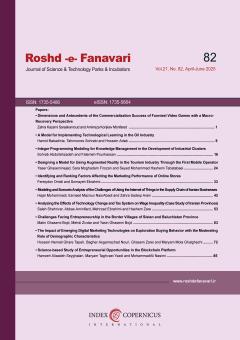Analyzing the effects of technology change and tax system on wage inequality (case study of Iranian provinces)
Subject Areas : مديريت تکنولوژيSaleh Shahrivar 1 , abbas aminifard 2 , mehrzad ebrahimi 3 * , Hashem Zare 4
1 - Ph.d. student in economics, shiraz branch, Islamic azad university, shiraz, iran
2 - Assistant professor, faculty of economics, shiraz branch, Islamic azad university, shiraz, iran
3 - Assistant professor, faculty of economics, shiraz branch, Islamic azad university, shiraz, iran
4 - Assistant professor, faculty of economics, shiraz branch, Islamic azad university, shiraz, iran
Keywords: Technology, tax system, wage inequality, Iranian provinces, EGLS model.,
Abstract :
The advancement of technology and the increase in the skill level of people has led to higher wages and subsequently led to an increase in wage inequality. In this regard, tax resources are the most important tool of the government to improve this gap. This research aims to answer the question, has the tax system in Iran been effective in eliminating the wage gap, and if so, to what extent is it capable of compensating this inequality? This article examines the effect of technology change and tax system on wage inequality using the panel econometric technique of Weighted Least Squares (EGLS) during the period of 1389-1398 in 11 provinces that collect nearly 95% of the country's taxes. The estimation results show that with a one percent change in technology, wage inequality increases by nearly 16%, and in the second model with pure data (the presence of taxes), this change reaches nearly 10%. It can be concluded that the tax in Iran has an effect on reducing wage inequality and the effect of this compensation is 6%, but it has not been able to close the entire gap
1- عیسی زاده، یوسف، آقایی، مجید. (1397). نقش فناوری اطلاعات و ارتباطات در رابطه بین سرمایهگذاری مستقیم خارجی و نابرابری درآمد: شواهدی از کشورهای منتخب. مطالعات مدیریت کسب و کار هوشمند، 6(23)، 83-106.
2- عیسی زاده، یوسف، آقایی، مجید. (1398). بررسی اثر دسترسی به فناوری اطلاعات و ارتباطات (ICT) بر توزیع درآمد در استان های کشور، پژوهش های رشد و توسعه پایدار سال نوزدهم زمستان، شماره 4، 158-131
3- ملااسمعیلی دهشیری، حسن، پژویان، جمشید، غفاری، فرهاد، و حسینی، سیدشمس الدین. (1401). تحلیل اثر سیاست مالی (مالیات بر مجموع درآمد) بر توزیع درآمد کشورهای منتخب OECD. اقتصاد مالی (اقتصاد مالی و توسعه)، 16(58 )، 93-108
4- Antonelli, C., & Gehringer, A. (2017). Technological change, rent and income inequalities: A Schumpeterian approach. Technological Forecasting and Social Change, 115, 85-98.
5- Ales, L., Kurnaz, M., & Sleet, C. (2015). Technical change, wage inequality, and taxes. American Economic Review, 105(10), 3061-3101.
6- Appleyard, M. M. Chesbrough, H. W., &. (2007). Open innovation and strategy. California management review, 50(1), 57-76.
7- Ang, J. B. (2008). A survey of recent developments in the literature of finance and growth. Journal of economic Surveys, 22(3), 536-576.
8- Anwar, S., & Rice, J. (2009). Labour mobility and wage inequality in the presence of endogenous foreign investment. Economic Modelling, 26(6), 1135-1139.
9- Bozio, Antoine and Breda, Thomas and Guillot, Malka, The Contribution of Payroll Taxation to Wage Inequality in France. IZA Discussion Paper No. 13317, Available at SSRN: https://ssrn.com/abstract=3620632 or http://dx.doi.org/10.2139/ssrn.3620632
10- DeLorme, D. E., & Reid, L. N. (1999). Moviegoers' experiences and interpretations of brands in films revisited. Journal of advertising, 28(2), 71-95.
11- Glazer, A., & Ranjan, P. (2003). Preference heterogeneity, wage inequality, and trade. Journal of International Economics, 60(2), 455-469.
12- Hill, C. W., & Rothaermel, F. T. (2003). The performance of incumbent firms in the face of radical technological innovation. Academy of management review, 28(2), 257-274.
13- Lee, I. (2022). Technological progress and optimal income taxation. Economic Research-Ekonomska Istraživanja, 1-26
14- Mellacher, P., & Scheuer, T. (2021). Wage inequality, labor market polarization and skill-biased technological change: an evolutionary (agent-based) approach. Computational Economics, 58(2), 233-278

